According to the Federal Bureau of Investigation (FBI), there were more than half a million home burglaries in the United States in 2019, with more than 50% of them occurring during the day. Why should these statistics concern you? Because if you don’t take preventative steps to protect your home and valuables, you too could become a statistic.
A reliable home security system can help you protect your home, your belongings, and your family.
This guide will help you understand the features and cost of the 10 best home security systems of 2023 so you can decide what’s going on.
Our Top 10 Best Home Security Systems and Companies:
- ADT: Best Overall Home Security System
- Vivint: Best for Smart Security
- SimpliSafe: Best for Hassle-Free Coverage
- Cove: Best for 360-Degree Security
- Frontpoint Security: Best for Budget
- SecurityPricer: Best for Comparisons
- ADT Self-Regulation. best for short-term contracts
- Scout Alarm: best for self-installation
- Link Home Security: best for wireless installation
- Deep Sentinel: best for real-time monitoring
Our Methodology: How We Reviewed the Best Home Security Systems & Companies
To get the best advice and information when comparing home security companies, we test the security systems we recommend in the real world whenever possible. We also analyze third-party user reviews and social media reviews. Our comprehensive methodology is based on the following factors:
- Upfront and monthly costs: Ease of installation
- Ease of use
- Quality of hardware and software
- Mobile app functionality
- Customer support
- Customer reviews
Our Top 10 Best Home Security Systems
ADT is a trusted home security company
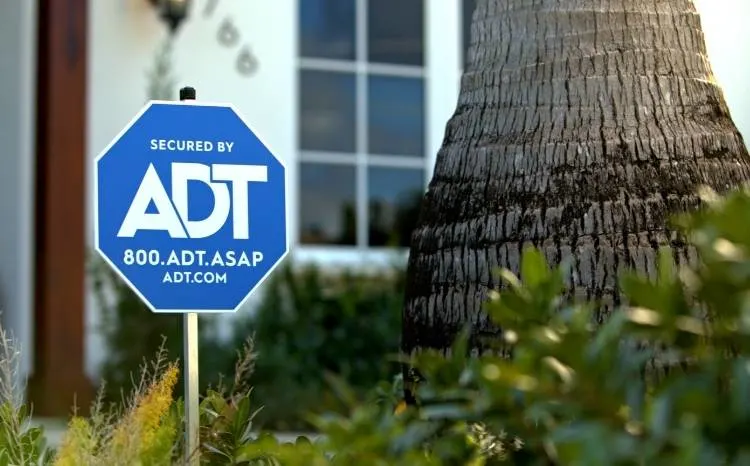
ADT is a trusted home security company with over 140 years of experience in the industry. They offer a wide range of services, including 24/7 monitoring, professional installation, and a wide range of equipment, such as cameras, door and window sensors, and smart home devices.
StarLinkHow cybersecurity expert Andrew Sinden notes that ADT is “a reputable company with a long history of providing reliable, comprehensive security solutions.” This opinion is especially reflected in ADT’s many positive customer reviews and six-month money-back guarantee, which is the longest full refund period on our list.
Why we chose ADT: They use smart home integration and offer complete 24/7 protection. You can even monitor your home and security system from anywhere in the world via their mobile app.
Our experience: Installation was quick and hassle-free; the technician also helped us install the mobile app and put up a sign in the yard indicating that the home has a security system.
Read ADT review
PROS
- 24/7 professional monitoring
- Personal security systems
- Mobile app has overwhelmingly positive reviews
CONS
- Three-year fixed contract.
- Requires professional installation.
Vivint
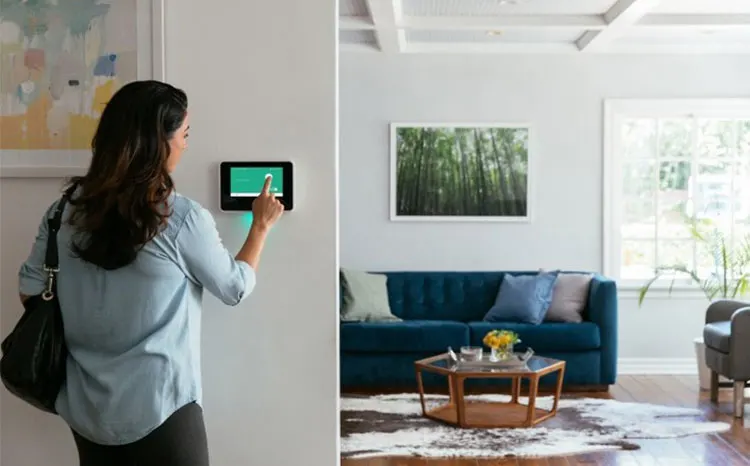
Vivint is a highly rated company that offers a variety of smart security packages. Its app gives you complete control over your home, letting you turn lights on and off, monitor security cameras, and lock and unlock doors right from your phone.
WireQuality Editor-in-Chief Raj describes Vivint as “an innovative home technology provider” and highlights its commitment to “ease of use, seamless connectivity, and improving homeowner safety and convenience.”
Why we chose Vivint: Vivint’s professional installers assess your home before installing the equipment, so you get personalized service from day one. They even offer energy management services to save you money on your energy bills.
Our experience: We liked Vivint’s Smart Detector technology, which uses sounds and lights to deter potential burglars as soon as security sensors detect them.
Read the Vivint review
PROS
- Innovative smart detector technology
- Customized security solutions
- Integration with home automation devices
CONS
- Money-back guarantee due to opaque window
- No do-it-yourself installation options
SimpliSafe
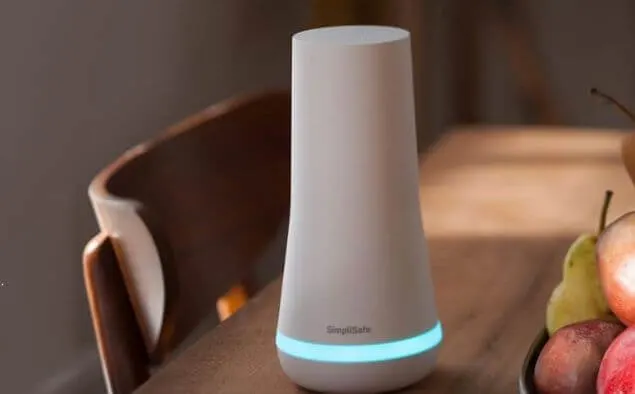
SimpliSafe offers easy-to-use, reliable, and customizable wireless security systems with 24/7 monitoring. You can choose the level of service you need for installation (professional or self-installation) and the level of monitoring you want.
Eric Lee, co-founder of real estate investment firm REI Insiders, says that “SimpliSafe is a great, affordable option that’s easy to install and use.” Most of its devices, like doorbells and smart locks, can also be connected.
Why we chose SimpliSafe: SimpliSafe’s wireless systems don’t require professional installation, although they do offer it as an optional extra. Plus, all of their contracts are monthly, so you don’t have to sign an annual contract like some other companies.
Our experience: Installing the monitoring system and connecting the components is easy thanks to the included adhesive pads. Accessing customer service was also convenient. We especially liked their live chat feature.
Read SimpliSafe review
PROS
- Easy, no-drill installation
- Works with Wi-Fi and cellular networks.
- No contracts
CONS
- Various smart home integrations
- Not as reliable as other systems.
Cove
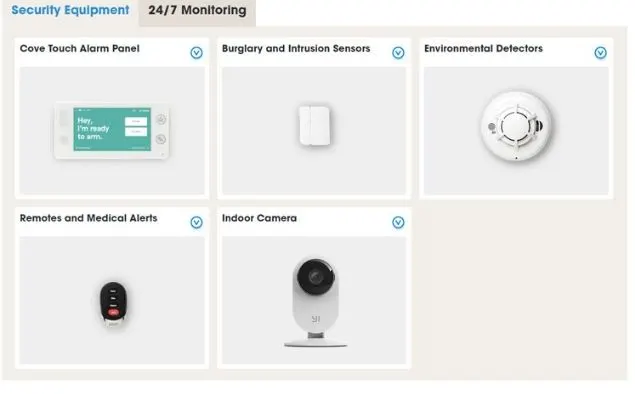
Cove offers high-quality home security equipment, including video surveillance, smart sensors, and alarm systems. Its installation process is easy to use, and user reviews are very encouraging.
To use Cove’s products, you need to subscribe to one of two monthly professional monitoring plans: Cove Basic or Cove Plus. Cove Plus includes the use of security cameras, while Cove Basic does not. Cove does not require a contract, but make sure you are aware of your monthly payments, otherwise your devices will simply stop working.
Why we chose Cove: Their security system has 24/7 customer support and is compatible with Android and iOS mobile devices. All products also come with a 60-day money-back guarantee.
Our experience: We liked the 24/7 access to Cove’s emergency response center through the system, which we didn’t see with other standalone solutions.
Read the Cove review
PROS
- Easy setup
- Affordable monthly pricing
- Specialized security solutions
CONS
- Only available in the US
- Users report a buggy mobile app.
Frontpoint
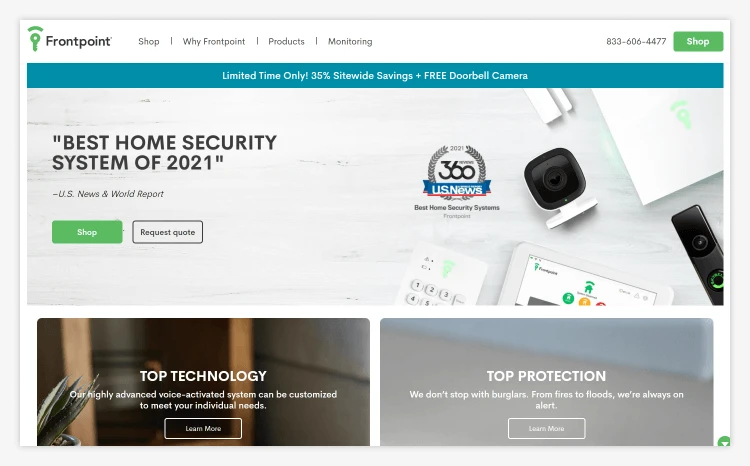
Frontpoint Security is ideal for unstable Wi-Fi connections.
Their service is exceptional; operators are very responsive and available from 8:00 AM to 5:00 PM and until 11:00 PM on weekends. Thanks to them, customers benefit from security combined with smart technology. Their devices are integrated with Google Assistant and Alexa.
Why did we choose Frontpoint Security? It’s ideal for renters, and you can take it with you when you move.
Our experience: We liked that we were able to use the investment cost, and instead of buying it outright, it’s the most cost-effective option. We’re happy with it.
Frontpoint Security Review
PROS
- and:
- Quick and easy installation
- Excellent customer service
CONS
- Options not available
- Monthly recurring fees
SecurityPricer
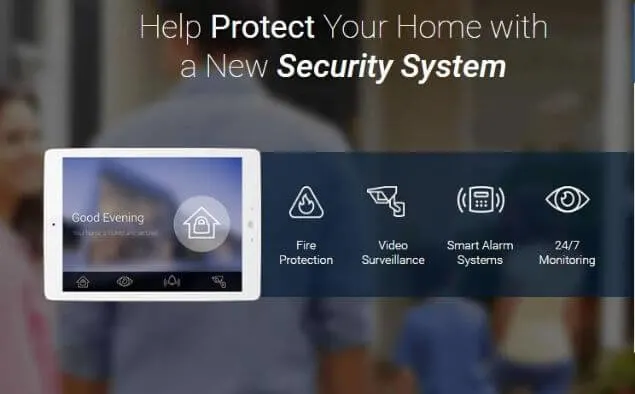
SecurityPricer is a comparison site that offers free quotes from the best home security companies on the market. While it’s not a home security provider, it does allow you to compare prices and features of companies in your area.
It shows you options from home security brands after you enter your address and answer a few questions about your security preferences. You can even schedule an appointment online.
Why we chose SecurityPricer: SecurityPricer is completely free. It’s a particularly useful resource for comparing services and making the best purchasing decision for your needs.
Our experience: While it was easy to find basic information, we wish we didn’t have to navigate to each brand’s website for more details.
Read SecurityPricer review
PROS
- Free quotes from home security providers near you
- Easy-to-navigate platform
- Works with leading home security brands.
CONS
- Not a home security system in itself.
- Search results may be limited.
ADT Self Setup

ADT Self Setup is ADT’s do-it-yourself security solution. It allows you to install and monitor your home security system without professional help.
The system includes features such as door and window sensors, motion detectors, and a mobile app for remote control and monitoring. The advantage is that you get a flexible security system with the same excellent service as professionally installed ADT security systems.
Why we chose ADT Self Setup: It’s an ideal option for those who want to save on installation costs and directly monitor their home security.
Our experience: The ADT Self Setup product integrates with Google Nest, which made it easy for us to set up the system and connect it to our smartphones and other compatible devices.
Read the ADT Auto Setup review
PROS
- Choose between self-monitoring and professional monitoring
- Easy do-it-yourself installation
- Smart home integration
CONS
- No long-term contracts
- Smoke detector does not detect carbon monoxide
Scout
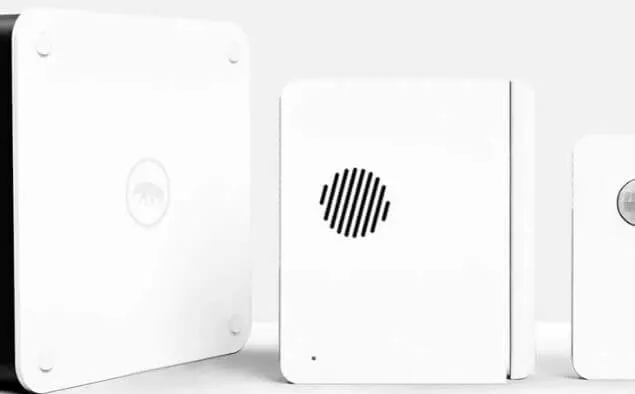
Scout Alarm’s core offering is a modern, easy-to-use home security system that can be customized to suit each homeowner’s needs.
The Self-Monitoring (Always On) plan costs $9.99 per month, while the Professional Monitoring (Always On+) plan costs $19.99 per month. Key features include customizable phone and email notifications, as well as cell phone and battery backup.
Why we chose Scout Alarm: You can set up the security features you want for your home without any setup fees. The Advanced plan sends emergency calls to police and fire departments.
Our experience: It took us just 45 minutes to set up the Scout Mini. The process was as simple as connecting the Scout Hub to your Wi-Fi router with an Ethernet cable, entering the setup code on the quick start card, and giving the Hub permission to sync with each device.
Read the Scout Alarm review
PROS
- Multiple smartphone app integration
- Affordable, low-maintenance hardware
- 24/7 professional monitoring on the Advanced plan
CONS
- No outdoor cameras
- Not yet upgraded to 5G technology
Link Interactive
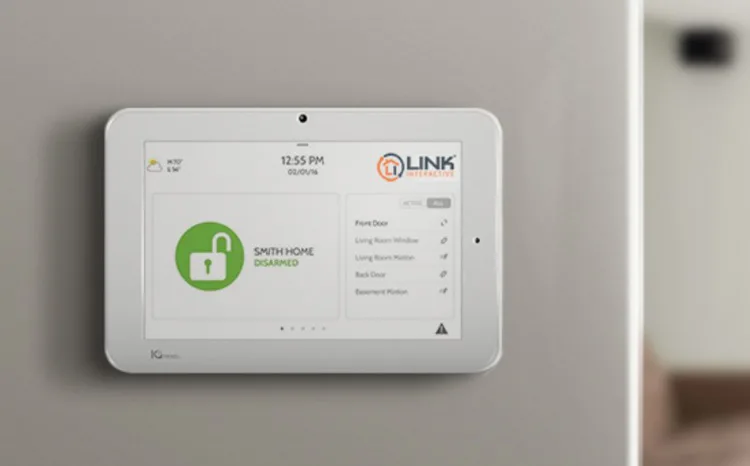
Link Interactive is a self-service security service that lets you do the initial setup but offers help when you need it. If you’re having trouble setting up your system, Link’s call center is staffed with experts to help you.
Their systems are highly customizable, and their contracts are flexible and have no cancellation fees (meaning you can cancel without paying), making it easy to customize your setup to suit your needs. You can also connect security cameras, add home automation devices, and install security alarms.
Why we chose Link Interactive: You can choose individual components, such as glass break sensors, automatic lights, and panic buttons, for your system. There’s no need to buy a more expensive package with multiple components.
Our experience: Wireless technology eliminates the need to run wires between rooms or drill holes in walls. Since the sensors and motion detectors were so easy to install—just peel and stick—we really liked the product’s ease of use.
Read the link: Home Security Review
PROS
- No drilling required, easy to install
- Lots of components to customize the system
- Three-year manufacturer’s warranty
CONS
- Unprofessional installation
- Long-term contract
Deep Sentinel
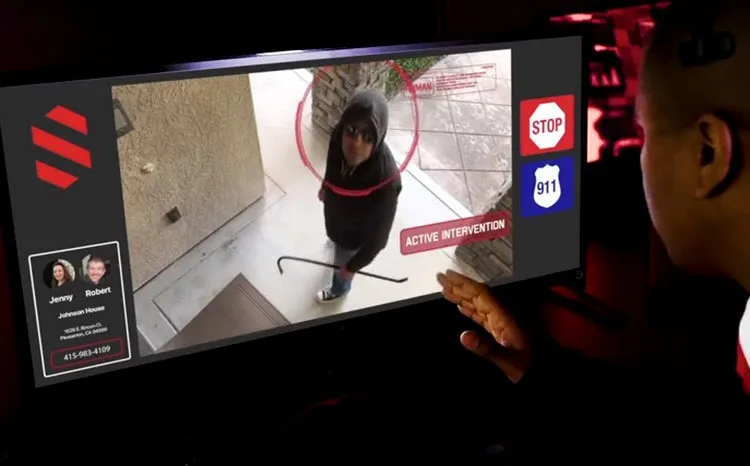
Deep Sentinel is an innovative security company that uses advanced technology to prevent crimes before they happen. Its security system is powered by facial recognition software and live video surveillance, features that should be essential for a truly reliable security product.
Deep Sentinel uses artificial intelligence and professional 24/7 surveillance. Its video feed is also analyzed by an artificial intelligence center to detect potential threats.
Why we chose Deep Sentinel: With an easy-to-use mobile app and excellent AI-based technology, Deep Sentinel is an advanced and reliable security solution.
Our experience: Although they are more expensive than other companies, we liked that their security guards are specially trained and can respond quickly when needed.
Read the Deep Sentinel review
PROS
- Cameras equipped with two-way audio.
- 24/7 professional human monitoring
- AI-powered threat detection system
CONS
- Lack of smart home integration
- Expensive
Comparing the Best Home Security Systems & Companies
Our home security system comparison chart shows the prices, money-back guarantees, and warranty periods of the companies we reviewed. When comparing home security systems, consider factors like hardware options, monitoring services, and customer support. Read reviews and ratings from trusted sources to make sure you’re choosing a company you can trust. Finally, consider any additional features or services that are important to you, such as home automation integration, mobile backup, or mobile app management.
Who Should Consider Getting a Home Security System?
*Nest Doorbell with free professional installation. Requires a 36-month monitoring contract, starting at $56.99/month. With QSP (24-month contract in California, total payments starting at $1,367.76) and ADT EasyPay subscription. Offer includes installation of one (1) Nest Doorbell with a minimum price of $599 after geographic promotion. Maximum discount: $229. Nest Doorbell includes wired or battery-powered options. Offer valid for new ADT customers only. Limit: one per customer; not combinable with other offers. In the event of early termination by the customer, ADT may charge 75% of the monthly service fees for the remainder of the original contract term. The Quality Service Plan (QSP) is ADT’s extended limited warranty. Service and installation fees vary based on system configuration, hardware, and services selected. Google and Nest Doorbell are trademarks of Google LLC. Some features, such as mobile notifications, remote control, video streaming, and recording, require active internet and Wi-Fi. Minimum operating system requirements are available at g.co/home/req. iOS is a trademark of Cisco and is used under license. Expires November 30, 2023.
Home security systems are an important investment in protecting your home and family. They include a variety of sensors and technologies that help protect your valuables, both inside and outside your home.
If someone is working in your home, such as a cleaning or maintenance crew, indoor cameras also allow you to verify that they have completed their work and that nothing has been damaged or stolen. Additionally, you can identify anyone who might be trying to steal your packages with a home security camera and sensors. You can even deter them by setting off an alarm that sounds when someone approaches your door or porch.
How Do Home Security Systems Work?
What Are Common Components of a Security System?
Home security systems work through a combination of sensors, cameras, and alarms to detect and respond to potential intruders. Common components include:
Control Panel
A central control panel communicates with the various sensors and cameras in your home. You can use it to arm and disarm the system, and depending on the type, you can also monitor your home in real time via a mobile app or web portal.
Video Surveillance
Video surveillance, also known as closed-circuit television (CCTV), uses cameras to monitor specific areas. The cameras record video images that you can also view in real time. Video surveillance significantly reduces crime in residential areas and can help identify potential suspects in the event of a crime.
Burglar Alarms
When a sensor is triggered, an alarm sounds to alert you and those around you of a potential intrusion. Burglar alarms can be installed as a stand-alone system or as part of a more comprehensive home security package.
Motion Sensors
When a sensor detects movement or other disturbance in an area, it sends a signal to the control panel, activating the alarm or sending a signal to your connected smartphone.
Contact Sensors
A contact sensor, also known as a door/window sensor or magnetic sensor, detects when a door, window, or other entry point is opened or closed. A magnet is placed on the door or window, and a door sensor is placed on the frame. When someone opens the door or window, the magnet moves away from the sensor, activating the alarm.
Glass-Break Sensors
These are sound detectors that activate when a window or glass door is broken, which could indicate a potential intruder. They can be wired or wireless. Some models have adjustable sensitivity levels or the ability to distinguish the sound of broken glass from other loud noises.
Yard Signs and Stickers
When thieves know your home has a security system, they are much less likely to break in and look for another target. Many companies offer yard signs and tags to show that your home is monitored and protected. The stickers are usually placed on various doors and windows in the home, with the tag placed in front.
Environmental Sensors
Environmental sensors monitor various conditions in a home or building.
- The presence of fire and smoke.
- Dangerous levels of carbon dioxide.
- Extreme temperature fluctuations.
- Humidity levels.
- Water leaks.
- Air quality.
Choosing the Right Home Security System
When choosing a home security system, follow these steps:
1. Assess Your Security Requirements
security needs
Assess your home or property and look for ways a burglar might try to break in.
2. Determine Your Budget
Calculate how much you are willing to spend compared to the value of your assets.
3. Conduct Thorough Research
Before choosing a security system, do your research and compare available security devices and features based on reviews from previous users.
4. Decide Between Professional or DIY Installation and Monitoring
If not, choose a company or package that includes professional installation and 24/7 monitoring.
5. Consult With a Professional
If you are hiring a professional installation company, you can meet with a representative to discuss and discuss your needs.
How Much Does a Reliable Security System Cost?
On average, the initial cost of a home security system can range from $200 for a self-installation kit to over $1,000 for a professionally installed and monitored system. Monitoring costs typically range from $20 to $50, depending on whether the system is self-monitored or professionally installed.
Indoor camera systems cost around $100, and outdoor cameras cost around $200. Door and window sensors typically cost around $30, while ambient smoke and carbon monoxide sensors average around $100.
Systems that include only basic sensor types are usually more affordable than systems with smart home integrations and more advanced devices (such as the best home security cameras and doorbells).
Exploring Different Types of Home Security Systems
There are several types of home security systems. Some of the most common include:
Wired Systems
These connect to the home’s electrical system and usually require professional installation. They are more reliable than wireless systems, but tend to be more expensive and difficult to install.
Wireless Systems
These systems use wireless technology (WiFi or cellular) to connect to various security components. They are easier to install than wired systems and are usually less expensive, but are less reliable in areas with weak signals.
Monitored Systems
These systems are usually professionally installed home security packages that are connected to an external monitoring center. They provide greater peace of mind, but are more expensive than unmonitored systems.
Unmonitored Systems
Unmonitored systems are more affordable than monitored systems, but are less reliable. They require you to manually respond to alarms and warnings.
DIY Home Security Systems: A Practical Option
Do-it-yourself systems like SimpliSafe and Cove are ideal if you only have basic security needs. They are generally the best home security systems for renters because they are designed to be easy to install and remove when needed. Plus, you save on the cost of the security system by installing and monitoring it yourself, which is ideal if you are on a tight budget.
However, do-it-yourself products cannot provide the same level of security or reliability as a professional. You need to make sure they are installed correctly and that all sensors and cameras are working properly. You also need to monitor the system yourself and respond to any alarms or warnings. This can be time-consuming and not possible if you have a busy schedule or limited technical knowledge.
Professional Home Security Systems: Enhanced Protection
Professional systems like Brinks Home Security and Vector Security are the best home security systems for homeowners. They are suitable for those with one-time or long-term security needs or those who own high-value items. They also offer 24/7 monitoring and respond to intruder alarms or other security breaches.
Useful Tips for Home Security Systems
You can ensure your home security system has the level of protection you need by following these tips.
- Choose the right package. Home security systems come in a variety of configurations, so choose one that fits your specific needs.
Consider factors such as the size of your home, the level of security you want, and your budget.
- Install the system correctly. For your home security system to work properly, proper installation is essential. If you don’t want to install a home security system yourself or don’t feel comfortable doing it yourself, it’s recommended that you hire a professional.
- Check your devices. Whether you choose a monitored or unattended system, regularly check your security system to make sure all devices are working properly. This will help you spot any issues before they become problems.
- Monitor the system regularly. If you have a self-monitoring system, you should review surveillance footage frequently and respond promptly to alerts or alarms. This will also help you know if someone is monitoring your home to detect future burglaries.
Take additional security measures. Consider installing locks on all exterior doors, using motion-activated lights, and trimming bushes or trees that could provide shelter for thieves.
Additional Home Security Systems We’ve Reviewed
In addition to the providers listed above, we also reviewed the following companies using the same methodology:
- Guardian Protection: Best Mobile App with Custom Automation
- CenturyLink: Best Option for Security Packages with Home Communications
- Protect America: Best Do-It-Yourself System with No Upfront Cost
Interesting Articles on Home Security
- 10 Signs Someone Is Watching Your Home
- The 10 Highest Burglary Rates in the U.S., by State
- 10 Weird Things People Have Caught on Their Home Security Cameras
Protect Your Home Effectively
Regardless of size, type, or location, any home can benefit from a security system, especially when it comes to deterring burglars. With the right security system, you can enjoy greater peace of mind and protect your home and loved ones from potential threats.




